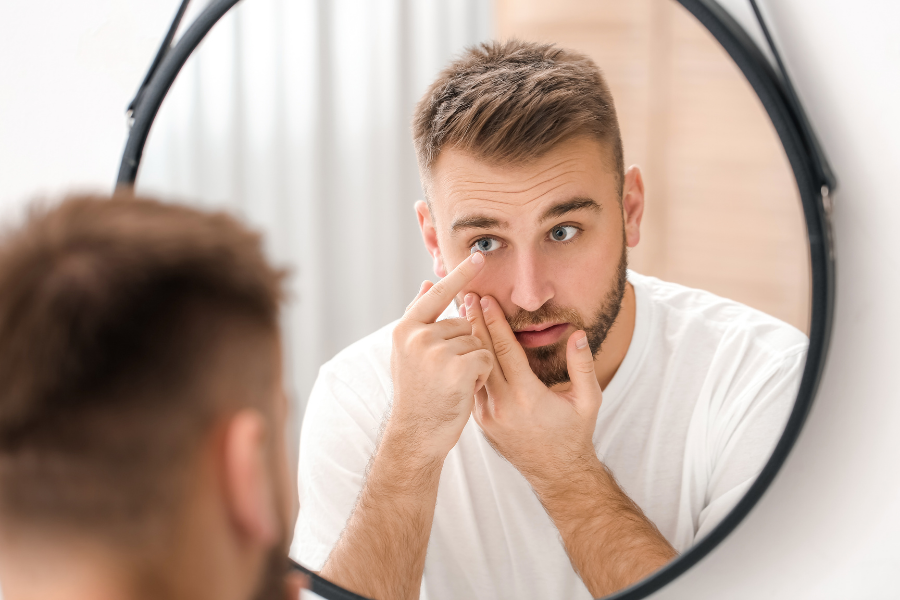Top 10 Contact Lens Tips
Remember when you first started wearing contact lenses? You may have found it was a little daunting in the beginning. The process of inserting and removing the lenses, getting comfortable touching your eyeball and then there’s all the hygiene protocols to follow. Along the way it’s easy to forget the “must dos” for good eye health and vision. So to help you out we’ve compiled our top ten tips for contact lens wearers – you’re welcome.
- Wash your hands before touching your lens
If you don’t, you risk cross contamination by depositing microorganisms from your hands to the lens thus increasing your risk for infection. You could for example, end up with conjunctivitis or a more serious corneal infection, which can increase the risk of permanent vision loss. When washing your hands, use a disinfected soap and dry them with a paper towel to avoid getting lint in your eyes.
- Check that your lens isn’t inside out and is not torn
Wearing the lens the wrong way generally won’t affect your vision but it may feel uncomfortable. Likewise, a torn lens can cause irritation so best to keep your fingernails short to help avoid accidentally ripping your lenses.
- Have eye drops on hand
Healthy eyes need to stay moisturised and contact lenses may make your eyes feel drier than usual especially if you are in air-conditioning. Your local EyeQ optometrist can recommend which eye drop will be best suited to your individual needs.
- Wash your case after each use
If you’re being totally honest with yourself, how often do you wash your contact lens case? (is that crickets we hear)? Contact lens cases are susceptible to bacterial growth which means if you’re not cleaning your case regularly you are likely creating a breeding ground for germs. Best practice suggests disposing of the old solution, rinsing it out with fresh solution, wiping it with a clean tissue or paper towel and leaving it to air dry face down with the caps off.
- Replace your case regularly
Even if your case looks brand spanking new it’s really important to replace it every three months. A biofilm can form in your case helping bacteria hide from the disinfectant in your contact lens solution which again doesn’t support healthy eyes.
- Store your contact lens case in a clean, low humidity environment
While it makes practical sense to keep your contact lenses in the bathroom it’s probably not the best idea (how super impractical)!
You may be surprised that cultures of contact lens cases have found faecal matter in them, which occurs when the case is kept in the bathroom without the lens caps on, flushing the toilet creates a mist of spray that settles inside the case, yuck!
- Only wear your contact lenses for the recommended time
Follow your optometrist’s instructions regarding the length of time to wear and use your lenses. For example, if the lenses are designed to be replaced every month don’t wear them for two. Your risk of serious eye infections increases if you overwear your contacts.
- Don’t sleep in your contact lenses
Unless your optometrist has advised you to do so it’s important that you don’t ever sleep in your contact lenses. Doing so drastically increases your risk of eye infection. The contact lens limits your eyes from getting oxygen and hydration which it needs to fight off any microbial invasion.
- Insert your contact lenses before applying make-up
Once you’ve washed your hands you should insert your contacts before applying moisturiser or make-up. It’s easy for any residue left on your fingers to make its way into your eyes or onto your contact lenses.
- Consider daily disposable lenses
There are two major benefits to wearing daily disposable contact lenses. Firstly, they are super convenient as no lens cleaning or maintenance is required. You literally wear your lenses for the day and throw them out once removed. Bye-bye contact lens cases!
The other and more significant benefit is that daily contact lenses are healthier for your eyes as there’s a decreased risk of corneal infection.
Make an appointment to speak to our optometrist regarding your contact lens wear and cleaning practices if you have any questions or concerns.
School is back!
School is back and now is a great time to make an appointment to get your child's eyes tested either for the first time, or to get that review appointment that they may be due for.
Poor eyesight may cause learning and behaviour problems, which might be blamed on other things. This is especially true for young children, who may find it difficult to explain the difficulties they are having with their eyesight. They may not even be aware they have a problem at all.
Please book an appointment online or give us a call on 3899 4044.
We hope to see you soon.
Start the new year off with a fresh new look!
Start the new year off with a fresh new look! Many of the health funds re-set at the beginning of the year, so now might be a great time to use your new health benefits and enjoy little or no gap payment! Book an appointment online or visit our practice today a choose from our range of stylish spectacles.
We continue to welcome previous patients of John Mountford Optometrists.
Since July 2018, we have been welcoming previous patients of John Mountford Optometrists to Clarity Optometrists, Bulimba. If you are a previous patient of John Mountford Optometrists and you haven’t visited our practice before we warmly welcome you. Unless you requested otherwise on the closure of this practice, we will hold your health record for your ongoing care.
Please read the the letter sent to John's patients on June 1st 2018




